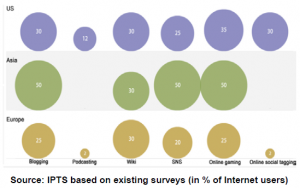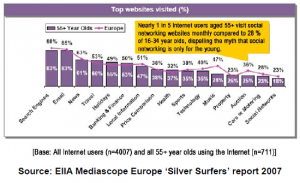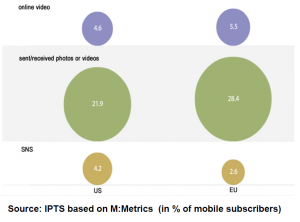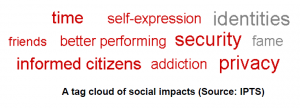ERoSC is an exploratory research project that aims at studying the socio-economic impact of emerging social computing applications. The exploratory research scheme of the European Commission Joint Research Centre’s Institute for Prospective Studies (IPTS) is an internal instrument aimed at building up competence in strategically relevant scientific fields. The ERoSC project has been awarded as the IPTS 2007 Exploratory Research project. Its purpose is to identify and discuss current and future socio-economic implications of social computing and to identify policy options for Europe.
A Multi-faceted Approach to Socioeconomic Impacts of Social Computing in European Context
In less than five years, social computing (SC), that is, digital applications that enable interaction and collaboration, whereby users are participants (co-creators not end-users) and interconnected (the network as a collective resource), has shifted from a niche activity into a phenomenon engaging tens of millions of Internet users. Nevertheless, there is very little research and evidence on the socio-economic impact of SC in the European context.
Set in this context, the main objectives of ERoSC can be summarised as follows:
- explore the socio-economic impact of social computing;
- assess the sustainability of social computing applications (business models and viability);
- assess the position of Europe in this field; and identify options for EU research and innovation policies.
Technological innovations have been scanned for available supply and demand data. Usage and the impact of SC in specific sectors have been explored using different analytical techniques, such as case studies, comparison of existing data and in-depth interviews. Finally, an expert workshop was conducted to validate the data. Peer reviewing by experts was used as an additional quality management tool.
Measuring and Analysing Social Computing
Social Computing is entering into a new stage of development. Blogging, photo- and video-sharing, social networking and social gaming have been adopted by some half of Internet users worldwide (around 25% in Europe), and high levels of growth in Europe have been reported in areas like blogging or online video. New social platforms are emerging that enable people to create more and richer content, which in turn generates network effects.

Social computing activates new market segments, for instance women or ‘silver surfers’ (people aged 55 or older).

People interplay with technology in many different ways. The majority of users tend to be ‘free riders’, that is, using SC content created by a ‘thin’ layer of core users (the ‘creators’). In Europe, roughly a third of Internet users also make use of SC contents, 10% provide feedback, 10% share contents, and only around 3% are those ‘creators’. Moreover, the intensity of use of SC applications is very diverse, for instance, people can be at the same time ‘creators’ and ‘free riders’.
Mobile – the ‘Next Frontier’?
A lot of innovation is taking place around mobile social computing. Mobile social computing, however, does not mirror the user participation of desktop-based social computing. Only a small user base has so far adopted mobile social computing, though there is evidence of growth. In the EU (selected countries), almost a third of mobile subscribers upload videos or photos on video/photo-sharing sites, with only 2.6 % accessing a social network via their mobile phones and 5.5 % watching video online. Teens are the most active users of mobile social computing.

The ‘Tag Cloud’ of Social Impacts of Social Computing
Social computing allows for more room for personal and social creativity, and it is a new means to develop and construct personal identities. Moreover, identity is now transformed by technology.
The ‘always–on’ trend raises concerns about this new form of dependency, where people need to first communicate with others to feel their own feelings. The networks of virtual ‘friends’ becomes as significant as ‘real’ life ones, evolving into new forms of social capital that is, social computing will encourage social networks that are well connected (bonding social capital) rather than bridge between different networks (bridging social capital). The proximity of celebrity condition gets closer (‘my 15-minutes of fame’).
Social computing allows for enhanced social participation, for instance in politics, and better informed citizens for different roles in society, such as as a voter, learner, patient or consumer.
At the same time, the dynamics of privacy is changing. Personal data recorded in databases are ‘perfectly transferable in space,[and] indefinitely preservable in time’ (Poster 1995). New social threats are emerging such as stalking and bullying or chains of suicides.

Economic Impacts of Social Computing
Social computing provides sources of revenue both for users and platforms. More important, social computing is a driver for competitiveness. Impacts can be observed on industry itself, for example media or ICT industry, but also on other industries using SC. More targeted marketing and user research, both based on user profiles and content interests, are opening new channels to markets. New employment possibilities are emerging through social networks and new opportunities to utilize user innovations for product development or as an interface between companies and customers and for more efficient work processes.
In order to realize the potential positive impact, there is a need to meet a number of challenges of productivity, security and training.
Policy Options for Europe
In order to put forward informed policy implications, proper measurements are needed. There is a lack, however, of internationally comparable data on social computing from national statistical sources, while data is available coming mostly from non-official sources. This points to the need for better and systematic measurements and internationally comparable data. Improvement of official statistics (e.g. OECD, Eurostat) by adding categories of Internet use by activity questions to surveys could be one possible avenue for meeting this need.
The implications of social computing for policies for education, health, inclusion and for the policy making process itself should be considered. In addition, policies could be developed to provide the necessary framework conditions that would favour people and companies (in particular start-ups) staying in Europe, including promoting entrepreneurship and dealing with intellectual property rights (IPR) and copyright issues that might prevent the further development of SC.
There is also room for policy activities to address social cohesion and exclusion of groups of people such as elderly and migrants, to support democratisation and eParticipation processes.
Another European strength lies with mobile technologies and mobile connectivity, together with a marked lead in mobile devices, hence providing a possibility for Europe to further develop relevant services, applications and platforms for mobile 2.0. An opportunity for Europe would also be to provide better access to public data, as such data are typically used in SC applications (e.g. mash-ups) to provide added value. Opening public data sets to allow citizens to create their own services could provide a boost to the use of SC, providing privacy and security concerns are adequately accommodated.
| Authors: | Corina Pascu corina.pascu@ec.europa.eu | ||||
| Sponsors: | European Commission, The Institute for Prospective Technological Studies JRC-IPTS | ||||
| Type: | Exploratory research (internal research scheme) | ||||
| Organizer: | European Commission, The Institute for Prospective Technological Studies JRC-IPTS, IS Unit Contact: Yves Punie yves.punie@ec.europa.eu | ||||
| Duration: | 2007 – 2008 | ||||
| Budget: | n.a. | ||||
| Time Horizon: | 2010 | ||||
| Date of Brief: | June 2008 | ||||
Download: EFMN Brief No. 147_ERoSC – Social Computing
Sources and References
http://is.jrc.ec.europa.eu/ is the main website where all reports and other information will be made available.
Pascu, C. (2008), ‘An Empirical Analysis of the Creation, Use and Adoption of Social Computing Applications’, EUR 23415, IPTS Report, European Commission,at http://ftp.jrc.es/EURdoc/JRC46431.pdf
Ala-Mutka, K. (2008), “Social Computing: the case of collaborative content”, IPTS Report, European Commission, forthcoming.
Cachia, R. (2008), “Social Computing: the case Social networking”, IPTS Report, European Commission, forthcoming.
Punie, Y., (Ed.) (2008) “The Socio-Economic Impact of Social Computing: Proceedings of a validation and policy options